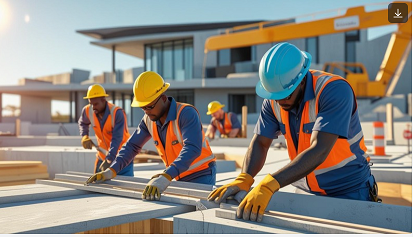Apply for construction work in Australia from Nigeria
Introduction
Australia’s booming infrastructure sector continues to open doors to foreign workers, including Nigerians, in the construction industry. With massive projects such as road development, railway upgrades, residential housing, commercial buildings, and mining infrastructure, there is a growing demand for skilled and unskilled construction workers. The good news? You don’t need a university degree to apply just the right skills, documentation, and determination.
For Nigerians looking to work abroad in a high-demand industry with visa sponsorship opportunities, construction work in Australia offers a practical and well-paying route. This guide covers everything you need to know: eligibility requirements, step-by-step application process, visa types, recruitment agencies, salary expectations, testimonials, and frequently asked questions.
Why Australia?
Australia’s economy is strong and resilient, with the construction industry contributing billions to the GDP. Here’s why Australia is a top destination for Nigerian construction job seekers:
-
High Demand: Shortage of labor in construction across major cities.
-
Good Pay: Competitive hourly wages, often starting at AUD $25–$45/hour.
-
Visa Sponsorship: Employers can sponsor eligible workers through programs like the TSS (Temporary Skill Shortage) visa.
-
Pathway to Permanent Residency: Many construction roles qualify for skilled migration programs.
-
Legal and Worker Protection: Australian labor laws protect all workers — including foreign nationals — with regards to safety, fair wages, and working conditions.
Apply for construction work in Australia from Nigeria
Types of Construction Jobs in Australia
Construction work in Australia varies from skilled to semi-skilled and even unskilled labor. Common roles include:
1. General Laborer
No degree or formal qualification is needed. Responsibilities include:
-
Site preparation and clean-up
-
Moving and unloading materials
-
Assisting tradespeople
2. Carpenter
Qualified carpenters are in high demand for both residential and commercial projects.
3. Bricklayer/Blocklayer
Vital for building walls, fences, and various structures.
4. Electricians
Install and maintain electrical systems in new and existing buildings.
5. Plumbers
Lay pipes, install fittings, and maintain water and gas systems.
6. Tilers, Roofers, Painters
Various finishing trades are highly sought after in housing and remodeling.
7. Site Supervisors and Engineers
If you have construction management experience or an engineering background, these roles offer higher pay and immigration advantages.
Eligibility Requirements for Nigerians
To apply for construction work in Australia from Nigeria, ensure you meet the following basic criteria:
Age Requirement
Most visas require applicants to be between 18–45 years of age.
Work Experience
-
For unskilled labor: 6 months to 1 year of experience can be helpful.
-
For skilled roles: Trade qualifications and 2–5 years of work experience.
English Language Proficiency
Though IELTS or other tests are often required for skilled visas, some sponsored roles may waive it if the employer accepts your communication skills.
Health and Character Checks
You’ll undergo a medical examination and may need a police clearance certificate.
Trade Recognition
For skilled jobs (e.g., carpentry, plumbing), recognition of your trade by Australian authorities may be required.
Step-by-Step Guide to Apply from Nigeria
Step 1: Prepare Your Documents
You will need:
-
Valid international passport
-
CV/resume tailored to Australian standards
-
Cover letter (for job application)
-
Educational and professional certificates
-
Police character certificate
-
Passport photograph
-
Evidence of work experience (reference letters, pay slips, etc.)
Step 2: Research Jobs and Apply
Use Australian job boards such as:
-
Seek.com.au
-
Indeed Australia
-
Jobactive
-
CareerOne
-
LinkedIn (Australia job filters)
Filter jobs by “Visa Sponsorship” or “International Applicants Welcome.”
Apply for construction work in Australia from Nigeria
Step 3: Apply Through Recruitment Agencies
Some agencies that help Nigerians and international applicants secure construction jobs include:
-
Hays Recruitment Australia
-
Blue Collar Recruitment
-
WorkPac Group
-
Programmed Skilled Workforce
Tip: Always verify the legitimacy of any agency before submitting documents.
Step 4: Apply for the Right Visa
Visa Options Include:
-
Subclass 482 – Temporary Skill Shortage (TSS) Visa
-
For skilled workers with employer sponsorship.
-
Duration: Up to 4 years.
-
-
Subclass 186 – Employer Nomination Scheme (ENS)
-
Permanent visa if sponsored by an employer after working for them under TSS.
-
-
Subclass 189/190 – Skilled Independent/State Sponsored
-
Based on points. Tradespeople with qualifications and experience can apply.
-
-
Working Holiday Visa (Subclass 417 or 462)
-
For youth (18–30), not usually open to Nigerians, but subject to bilateral agreements.
-
Expected Salary in Australia for Construction Workers
| Job Title | Average Monthly Salary (AUD) | Equivalent in NGN (approx.) |
|---|---|---|
| General Laborer | $3,500 – $4,800 | ₦2.3M – ₦3.2M |
| Carpenter | $4,000 – $6,500 | ₦2.6M – ₦4.3M |
| Electrician | $5,000 – $7,200 | ₦3.3M – ₦4.8M |
| Construction Manager | $7,500 – $11,000 | ₦5M – ₦7.3M |
Testimonials from Successful Nigerian Applicants
Chinedu O., Lagos → Perth
“I applied for a general laborer position in Western Australia through a recruitment agency. Within three months, I got a job offer with visa sponsorship. I now earn in one month what I earned in six months in Nigeria.”
Mariam A., Abuja → Melbourne
“As a female civil engineer, I thought it would be hard to find a job abroad. But Australia surprised me. Through LinkedIn, I got hired by a construction firm looking for women in construction!”
Frequently Asked Questions (FAQs)
1. Can I apply for construction jobs in Australia without a degree?
Yes. Most construction jobs require skills and experience, not university degrees.
2. Do I need IELTS to apply for construction work in Australia?
Only if you’re applying through a skilled migration visa. Some employer-sponsored jobs may waive IELTS if you can prove English proficiency.
3. How long does it take to process the visa?
Depending on the visa type, 2–6 months. Employer-sponsored visas may be faster.
4. Will the company pay for my flight and accommodation?
Some employers offer relocation assistance, including flight tickets, visa processing fees, and temporary accommodation.
5. What happens after the visa expires?
If you’re on a temporary visa, you can extend it, apply for permanent residency, or return to Nigeria. Always abide by visa rules.
6. Can I move with my family?
Yes. Certain visas allow dependents (spouse and children) to join you in Australia.
Final Thoughts
Applying for construction work in Australia from Nigeria is a practical path to earn good income, gain international experience, and potentially secure permanent residency. With the right strategy, patience, and documentation, thousands of Nigerians are making it each year.
This opportunity is not just about travel it’s about transforming your future through hard work and determination. Whether you are an unskilled laborer or a trained professional, Australia’s construction industry needs your energy and expertise.






